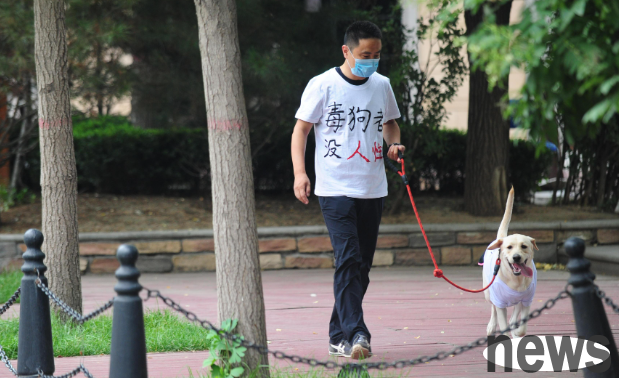"I heard that pollen can cause allergies, but I don't know it will cause allergies to pets." Yesterday, Ms. Zheng, a resident of the Petroleum Villa Community, was also confused. She said that after she came back from walking with her pet dog to the rapeseed field a few days ago, the puppy had abnormalities and went to the pet hospital for consultation. She was also told that it might be allergic, which made her a little unbelievable.

"After the weather gets warm, my Beijing dog suddenly loses appetite and sometimes suddenly has a throat stuck." Old Mrs. Chen said that after she sent the dog to a pet hospital for a careful examination, she found that the dog had neither cold nor pneumonia nor bronchitis. The pet doctor told her that the dog might be allergic to pollen. "Dogs can also be allergic to pollen?" Old Mrs. Chen was very confused.
Near RT-Mart in the West District, Ms. Wu, a citizen, said worriedly that their Labrador has been wilted this week and often coughs. At home, she has given the dog a long time to take animal medicine but has not been cured. After a lot of examinations, the doctor told her that their dog should be allergic to pollen.
"I heard that pollen can cause allergies, but I don't know it will cause allergies to pets." Yesterday, Ms. Zheng, a resident of the Petroleum Villa Community, was also confused. She said that after she came back from walking with her pet dog to the rapeseed field a few days ago, the puppy had abnormalities and went to the pet hospital for consultation. She was also told that it might be allergic, which made her a little unbelievable.
Willow catkins pollen can easily cause pet allergies
Pets can also be pollen allergies? Some pet doctors said that the number of pets who have come to the hospital recently due to pollen allergies has increased.
This period is the stage of Yangcheng willow catkins blooming, and it is also the peak period for pollen transmission. Some pets inhaled these tiny fibers will cause symptoms such as sneezing and coughing. Some pets may also have skin allergies, rashes appear on the epidermis, and even redness throughout the body. In "Guide Dog Xiao Q", Xiao Q is allergic to pollen!
Allergic Causes
The reason why pollen causes allergies in dogs is that pollen is rich in protein, and some protein components are the main allergens that produce allergies. Dogs with allergic constitutions will have an allergic reaction after inhaling these pollen. This is pollen allergic, also known as ‘dead fever’ or ‘seasonal allergic rhinitis’. Pollen allergies occur frequently in March to May every year. In spring, pollen is mainly allergens mainly from trees such as pine, oak, maple, and birch. Symptoms of seasonal allergies may include:
general itching (82%), increased tears (75.1%),
rash (45%),
mental loss (15.8%),
loss of appetite (7.2%),
cough (52%),
others (28.5%).

Clinical diagnosis:
1. X-ray detection: Check the dog's bones and internal organs from an imaging perspective. Determine whether there are morphological changes in the chest organs such as lungs, and whether there are swelling, shrinking, foreign bodies or stones in the abdominal organs such as liver and kidneys.
2. Blood test: The ratio of red and white blood cells can be detected to determine whether the body has anemia, bacterial and virus infection, parasite infection, etc., and whether there are functional abnormalities in the body's internal organs such as the liver, kidney, pancreas, etc.
3. Allergen detection: Detection of daily allergens containing inhalation (including dust mites, mold, pollen, animal skin and fur dandruff, etc.) and intake (including meat, seafood, fruits, seasonings and egg dairy products, etc.).
Protective measures:
1. Reduce the time to take the dog out: This can not only prevent the dog from receiving too much inhaled allergen from pollen fluff, but also prevent it from causing skin injury due to excessive exposure to the sun.
2. Pet masks: Although pet masks have some effects on preventing pollen allergies, some dogs may also cause mood swings due to discomfort when wearing masks first.
3. Anti-allergic drugs: There are a variety of anti-allergic drugs that boast about various functions. But the effect remains to be discussed, so when purchasing, you must consult your baby's attending doctor and prescribe the right medicine.
If you experience itchy skin, cough, difficulty breathing or asthma while playing with your baby in spring, you should go to a regular hospital for treatment in time to prevent shock in severe cases. I hope that with our careful care, the babies can also safely survive this colorful spring!